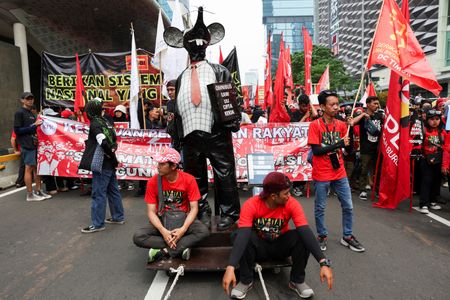By Ananda Teresia
JAKARTA (Reuters) – Indonesian worker groups said on Friday that a Constitutional Court ruling on labour laws should lead to higher minimum wages next year, even though parts of their petition challenging the legislation were rejected.
Late on Thursday, the court ordered changes to some labour rules, including the establishment of sectoral minimum wages and clearer rules on outsourcing, after unions challenged the laws.
The petition was filed against the Job Creation law, which was introduced by former president Joko Widodo to improve the investment climate in the country. The law triggered protests by labour and green groups, who saw it as too pro-business.
“This is a victory for the people. The ruling is a proof that the state does protect the people,” Said Iqbal, chairman of the Labour Party, a major union and political party that was among the petitioners, told Reuters.
The court’s order to set sectoral minimum wages would pave the way for higher pay for skilled workers, he said.
Andi Gani Nena Wea, chairman of the KSPSI labour union, also said the new formulation should raise next year’s minimum wage.
Indonesia’s Employers Association (Apindo) said they were still reviewing the ruling, and reiterated the importance of “synergy between employee and employers.”
While Apindo welcomed the ruling, which ordered the government and lawmakers to issue a new manpower law within two years, Bob Azam, the body’s head of manpower affairs, told Reuters the process must involve both employees and employers.
Indonesia’s Law Minister Supratman Andi Agtas said the government is ready to abide by the ruling and issue a new manpower law.
The Labour Party’s Said noted that while the court rejected the request to change the way minimum wage rises are calculated, the ruling did point to the potential for the basic needs of workers to be considered along with economic growth and inflation, which could also lead to higher increases next year.
The government is due to announce next year’s minimum wage before the end of 2024.KSPSI’s Andi also welcomed the ruling that the manpower ministry had to specify what kind of jobs could be outsourced, and limit such contracts to a maximum of five years.
(Reporting by Ananda Teresia, Editing by Gayatri Suroyo, John Mair)











